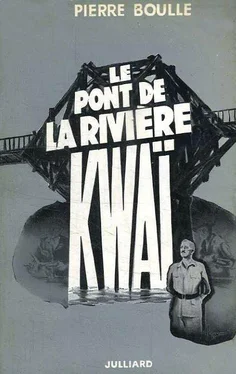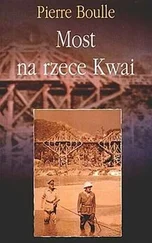“You’d better get some rest,” said Number One. “There’s no point in working yourself to death before we start. We want to have you in proper shape when the time comes. Why did you return so quickly?”
“The bridge will probably be finished in less than a month from now.”
All of a sudden Joyce fell asleep, without even taking off the make-up which made him unrecognizable. Shears shrugged his shoulders and did not attempt to wake him. He sat there alone, working out the part that each of them would play in the scene shortly to be enacted in the Kwai valley. He had not yet come to any decision when Warden returned with a handful of messages which he had just deciphered.
“It looks as if the balloon will go up any day now, Shears. Information from H.Q.: the railway’s almost finished along the whole of the line. The opening ceremony will probably be held in five or six weeks’ time—a ‘first’ train, crammed full of troops and V.I.P.s. A nice little celebration. A fair amount of war material as well. Things are looking up. H.Q. have passed all your plans and are giving you a completely free hand. The R.A.F. won’t interfere. We’ll be kept informed daily. The youngster’s asleep, is he?”
“Yes, don’t wake him up. He deserves a little rest. He did pretty well, you know. Tell me, Warden, do you think we can rely on him in any emergency?”
Warden thought the question over before answering.
“He looks all right to me. Of course, one can’t be sure beforehand, you know that as well as I do. But I know what you’re driving at. You want to know if he’s capable of taking an important decision in a matter of seconds, or even less, and acting on it. But what made you bring that up?”
“Because he just said: Tm the best swimmer of the three.’ And he’s not shooting a line. It’s true.”
“When I joined Force 316,” Warden growled, “I didn’t realize I would have to be a swimming champion in order to see some action. I’ll put in a little practice on my next leave.”
“There’s a psychological reason as well. If I don’t give him his head, he’ll lose confidence in himself, and then he’ll be utterly useless. As you say, we can’t be sure beforehand —even he can’t be—and meanwhile he’s dying to know. The main thing, of course, is whether he’s got as much chance as we have of bringing it off. I think he has… and also a chance of getting away with it. We’ll know for certain in a few days. I want to see what he looks like tomorrow. Let’s not mention the bridge to him for the time being. I don’t like the way he gets so worked up at the thought of those wretched prisoners. Oh, I know what you’re going to say—what one feels has got nothing to do with how one behaves. All the same, he’s rather inclined to get overwrought, to let his imagination run riot, if you know what I mean. He broods too much, that’s his trouble.”
“You can’t lay down a general rule for our sort of job,” Warden wisely observed. “Sometimes you get good results by using a little imagination, and even by brooding. Not always, of course.”
Colonel Nicholson also was worrying about the prisoners’ state of health, and had come to the hospital to discuss the matter with the M.O.
“We can’t go on like this, Clipton,” he said in a solemn, almost threatening tone of voice. “A man who’s dangerously ill can’t work, that’s obvious; but all the same, there’s a limit. You’ve now got half the personnel on the sick list! How do you expect us to get the bridge finished in a month? It’s well under way, I know, but there’s still a lot of work to be done, and with the teams reduced to half strength, we’re just marking time. Even the ones who are still on the job don’t seem up to the mark.”
“Look at them, sir,” said Clipton, who was so enraged by these words that he had to struggle to maintain his usual equanimity and show the necessary deference which the Colonel demanded of all his subordinates, no matter what their rank or position. “If I had listened to the voice of my professional conscience, or simply to the voice of human decency, it wouldn’t be half the personnel but the whole lot that I’d certify as unfit for work, especially this sort of work!”
For the first few months the bridge had gone forward at a spanking pace, with only an occasional setback caused by Saito’s moodiness. From time to time the Jap felt he ought to regain his position of authority and would try to give himself Dutch courage to overcome his complexes by a show of cruelty. But these outbursts had occurred less and less frequently, since it was quite obvious that any attempt at violence did nothing but impede progress on the bridge. For a long time the work had been well ahead of the schedule laid down by Major Hughes and Captain Reeves, thanks to a collaboration which was efficient, though not entirely free from friction. But the climate, the nature of the tasks imposed, the diet and the living conditions had all been a drain on the men’s health.
Their physical condition was becoming a real anxiety. With no meat, apart from some decrepit old cow which the natives from the nearest village occasionally sold them, with no butter and no bread, the prisoners, whose meals sometimes consisted of rice and nothing else, had been gradually reduced to the skin-and-bone condition which Joyce had found so pitiful. The hard labor of heaving all day long on a rope to lift the heavy weight which dropped back again and again with an ear-splitting crash had become real torture to the men in that particular team. Some of the others were no better off, especially the ones who had to spend hours on end on a scaffolding, up to their waists in water, to hold the piles in position while the ram thudded down over and over again, deafening them each time.
Their morale was still fairly high, thanks to the fine example set by officers like Lieutenant Harper, who showed magnificent drive and energy, shouting cheerful words of encouragement all day long, and willingly lending a hand himself, although he was an. officer, tugging at the rope with all his might so as to ease the burden of the weaker men. Their sense of humor was still in evidence on certain occasions, for instance whenever Captain Reeves appeared with his blueprint, ruler, spirit level, and other homemade instruments and crept along a rickety scaffolding just above water level in order to take certain measurements, followed by the little Japanese engineer, who dogged his footsteps, copied every gesture he made, and solemnly recorded some figures in a notebook.
Since all the officers modeled themselves directly on the Colonel, the fate of the bridge was entirely in his capable hands. He knew this, and felt the justified pride of the leader who welcomes and seeks responsibility, but also takes on his own shoulders the burden of worries which that post of honor entails.
The growing sick list was his chief anxiety. He saw his companies literally whittled down before his very eyes. Bit by bit, day by day, hour by hour, some of the living substance of each prisoner came apart from its individual organism to be swallowed up in the anonymous material universe. This universe of earth, monstrous vegetation, water, and mosquito-infested swamp was not perceptibly affected by this human contribution. In arithmetical terms, it was a complete transfer of molecules, which was felt as a severe loss by each individual and could be measured in pounds’ weight per man multiplied by five hundred, yet resulted in no appreciable total gain.
Clipton was frightened that there might be a fatal epidemic such as cholera, which had broken out in some of the other camps. This scourge had so far been avoided, thanks to strict discipline, but there were still countless cases of malaria, dysentery, and beri-beri. Every day he was forced to declare a large number of men unfit for duty and to put them on the sick list. In the hospital he managed to provide those who were able to eat with a fairly reasonable diet, thanks to a few Red Cross parcels which had escaped the prying hands of the Japanese and had been set aside for the patients. In any case, a few days’ off-duty was balm to some of the prisoners, who had worn themselves out on the ram and were consequently suffering from nervous prostration, seeing things, and living in a continual nightmare.
Читать дальше











